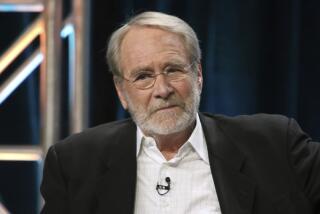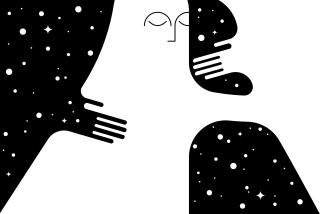‘MATTER OF HEART’: JUNG, PIONEER PSYCHIATRIST
- Share via
“Matter of Heart” (at the Goldwyn Pavilion) is an opportunity missed.
Director Mark Whitney and writer Suzanne Wagner took the trouble to interview 18 disciples of pioneering psychiatrist Carl Jung in Europe and America, yet failed to provide an outline of Jung’s thought and its development that would have lent more meaning to their subjects’ remarks. To most people, this film will be as elusive as the unconscious itself, which Jung attempted to explore so thoroughly in his long life.
It doesn’t count for much to hear these people--or Jung himself, who was interviewed in English for the camera extensively in his later years--expand upon such Jungian concepts as “the collective unconscious,” “archetypes” and so on, since they’re not succinctly defined nor are their relationships to each other clarified at the start. Even if some of the terms, such as transference , are very familiar, it would still be good to know precisely what they mean to the film makers and their interviewees.
In short, “Matter of Heart” is a terrible introduction to a great man, although it may well be cherished by his students, grateful that he and his ideas have been given such a human face by his friends and colleagues. What “Matter of Heart” primarily gives us are ideas about the importance of the individual, the need for knowledge of one’s interior life, accepting both the masculine and feminine impulses in one’s nature and learning how to live in harmony with oneself, with others and with the universe--all pretty general and by now fairly self-evident.
With a carefully thought-out, thoroughly organized context, the film could have been so much more rewarding because its subjects are so outstanding--men and women in their 70s and beyond, highly sophisticated people of formidable intellect and accomplishment. Doubtlessly, what they have to say about Jung’s thought is invaluable, but their interviewers--the film’s credits list seven--prompt the kind of responses that are aimed strictly toward the fully initiated.
Not surprisingly, “Matter of Heart” is more successful at the easier task of conveying some idea of Jung’s life and personality. We’re told how he inspired cults yet did not exploit them, that he truly gave of himself but was no saint--was, in fact, at times a tyrant. On camera he comes across as a man of considerable force.
There is some discussion of his unorthodox private life, for Jung drew staunch support and intellectual stimulus not only from his wife, Emma, mother of his five children, but also from his mistress, the intense-looking Toni Wolff. It is said that, nearing death, Emma expressed gratitude for Toni’s ability to provide her husband whatever she could not. Jung’s colleagues all express acceptance of this quite open menage a trois ; ironically, the only note of disapproval is sounded by Jung’s grandson.
If choosing an apt subject is half the battle in making a successful documentary, the other half is in providing enough background information so it can stand on its own, independent of a need for research to make it comprehensible. Sad to say, the makers of “Matter of Heart” (Times-rated Mature for highly complex material) scored on the first aspect, only to strike out on the second.
More to Read
Only good movies
Get the Indie Focus newsletter, Mark Olsen's weekly guide to the world of cinema.
You may occasionally receive promotional content from the Los Angeles Times.










